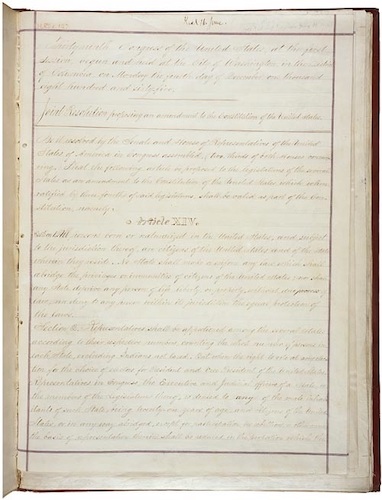Peirspictiochtai Ar An Saol
Options To Update Immigration Policies Into The United States Of America
Part Three
 The first page of the United States House of Representatives Joint Resolution Proposing the 14th Amendment to the U S Constitution. (This document was provided courtesy of The U S National Archives and Records Administration, June 16, 1866.)
The first page of the United States House of Representatives Joint Resolution Proposing the 14th Amendment to the U S Constitution. (This document was provided courtesy of The U S National Archives and Records Administration, June 16, 1866.)
In Part One of a series of news columns detailing options to update policies regarding immigration into the United States Of America, Peirspictiochtai Ar An Saol noted that land within the United States of America could potentially be leased permanently to another independent nation.
In Part Two of this series, Peirspictiochtai Ar An Saol detailed how certain people are able to be transported in vehicles to, from, and within the United States of America and yet not be subject to American laws.
This edition of Peirspictiochtai Ar An Saol details the specific requirements outlined in the U S Constitution for citizenship to be accorded at birth to all those born in the United States of America.
Some people enter the United States of America with the full expectation that they will give birth on American territory and, thus, will secure American citizenship for their newborn child or children.
This right – for people to be accorded American citizenship so long as the individual is born on American territory – is outlined in Section One of the 14th Amendment to the U S Constitution.
"On June 16, 1866, the [United States] House [of Representatives] Joint Resolution proposing the 14th Amendment to the [U S] Constitution was submitted to the states," according to The U S National Archives and Records Administration. "On July 28, 1868, the 14th amendment was declared, in a certificate of the [U S] Secretary of State, ratified by the necessary 28 of the 37 States, and became part of the supreme law of the land."
According to the U S Congress, Section One of the 14th Amendment states:
"All persons born or naturalized in the United States, and subject to the jurisdiction thereof, are citizens of the United States and of the State wherein they reside. No State shall make or enforce any law which shall abridge the privileges or immunities of citizens of the United States; nor shall any State deprive any person of life, liberty, or property, without due process of law; nor deny to any person within its jurisdiction the equal protection of the laws."
The first sentence, though, has two specific exceptions to what may appear to be very simple and clear in its wording.
One, the definition of "in the United States" has been adjusted several times through the years by the Federal government.
For example, almost all children born in the Northern Mariana Islands are considered American citizens at birth, while almost all children born in American Samoa are not considered American citizens at birth. The Federal government has implemented laws that accord American citizenship at birth to children born in the Northern Mariana Islands, but the Federal government has declined to accord American citizenship at birth to children born in American Samoa.
Two, the definition of "subject to the jurisdiction thereof" has been adjusted through the years by the Federal government.
Not everyone in the United States of America is subject to the jurisdiction of the United States of America.
According to a statement from the United States Citizenship and Immigration Services, "A person born in the United States to a foreign diplomatic officer accredited to the United States is not subject to the jurisdiction of United States law. Therefore, that person cannot be considered a U S citizen at birth under the 14th Amendment to the United States Constitution."
The U S State Department has specific policies in place regarding which representatives of other nations are considered not subject to the jurisdiction of the United States of America and which representatives of other nations are considered to be under the jurisdiction of the United States of America.
According to the U S Department of Homeland Security, the first group of people referenced are included in a list officially named the "Diplomatic List" and informally known as the "Blue List," while the second group of people referenced are included in a list officially named the "Employees of Diplomatic Missions Not Printed in the Diplomatic List" and informally known as the "White List."
A division of the U S State Department determines the individuals that appear on each of these lists.
The statement from the United States Citizenship and Immigration Services continued by also noting that while a person born to a foreign diplomatic officer accredited to the United States and not subject to the jurisdiction of United States law is not an American citizen, "This person may, however, be considered a permanent resident at birth and able to receive a Green Card through creation of record."
The next edition of Peirspictiochtai Ar An Saol details the potential of how pregnant women needing medical care as they seek to unofficially enter the United States of America could be transported from an international border area by way of vehicles of another nation to receive medical care on land permanently leased to another nation and, potentially, never be under the jurisdiction of the United States of America.
Peirspictiochtai Ar An Saol – Gaelic – Irish – for "Perspectives On Life" is a column focused on aspects of accountability and responsibility as well as ways people look at life.
Contact Richard McDonough at
© 2024 Richard McDonough










